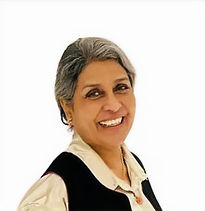Kriya
Make Every Indian Child Learn Science Experientially
Kriya aims to understand the impact of experiential learning of science on the development of competencies in school students in India.
The project intends to transform schools, empower teachers, and enrich student learning experiences, particularly for segments of society that lack such learning opportunities through a multi-year partnership with schools.
Integrating teacher empowerment, courseware, and lab resources, Kriya will transform schools into mature experiential learning centres. Kriya’s science teaching-learning experience for grades 6 - 10 has been developed based on the NCERT syllabus.
11200+
Students
330+
Teachers
112
Schools

Developing Competencies in Students
Kriya adopts an experiential, learner-centric approach to foster scientific temper and enhance scientific thinking skills. The program aims to cultivate decision-making abilities and strengthen problem-solving skills.
It focuses on developing a broad spectrum of competencies over a period of five years, including reasoning, critical thinking, and problem-solving. Additionally, it equips learners to effectively relate concepts and principles in real-world scenarios.

Teacher Empowerment Program
Teachers are the foundation for the transformation envisioned for schools. Teachers will become subject matter experts, capable of inspiring and training other teachers.
Kriya’s Teacher Empowerment Program (TEP) has been structured across 5 years to provide teachers with enhanced pedagogical knowledge, subject competence, resource development capabilities, and effective classroom management skills.
Every year, 3 intensive residential workshops are designed for teachers to
-
Help teachers transform into experiential facilitators
-
Utilize teaching methodologies and approaches to aid the development of competencies among learners
-
Use local resources and illustrations to make learning more context-specific
-
Connect science learning to real-life situations

Intensive Residential Workshops

Regular Interactions with Researchers

Online
Courses
Teacher
Collegium

Academic Coordinators assigned to every school provide year-round support to teachers with academic planning, class preparation, reflective activities, pedagogy, and classroom management. Senior Academic Coordinators facilitate the supportive functions to implement Kriya effectively.

Kriya Lab Stations
Kriya’s Lab Stations will provide end-to-end experiential learning for students in grades 6 to 10.
-
Curated for Experiential Learning for every grade
-
Materials for Every Child in every session for every experiment.
-
Well-organized, safe, and sturdy design
-
Lab Safety Manuals
-
Instruction Manuals in Kannada and English

Kriya Courseware
-
Rigorous pedagogical ideas curated exclusively for the Indian science curriculum
-
Comprehensive content was created by a research team of science researchers, education researchers, and experienced science teachers.
-
Designed to inspire and engage every child.
-
Ensures experiential learning of science in every session, enabling learning through a discovery approach.
-
Courseware in both Kannada and English
Kriya - An Education Research Project
Kriya's research will seek to understand the impact of experiential, Inquiry-based learning methods on students from a cross-section of schools in India’s societal context.
Kriya’s development spanned five years and engaged a multidisciplinary team including researchers in science, experienced science teachers, and pedagogy experts. The project's primary focus was on aligning its pedagogical approach with the curriculum prescribed by the NCERT.

Longitudinal Research spanning 5+ years

Multi-dimensional Research addressing cognitive and non-cognitive abilities.

Large sample size of students and teachers

Contextually relevant the Indian sociocultural setting
As one of the largest and comprehensive experimental studies in teaching-learning in India, Kriya's research data will provide insights into the learning patterns and capabilities of students in the Indian education system, providing valuable information to shape education policies and implementation strategies across a wide cross-section of schools.
Models, content and strategies, developed from intensive testing, will be made open-source for schools to implement experiential learning across diverse learning environments in the country.
Kriya Advisors

Prof. Nayana Tara
Prayoga is fortunate to be associated with Prof. Nayana Tara, whose guidance and direction to the Kriya projects will help Prayoga immensely by strengthening the Kriya project. Prof. Nayana Tara’s extensive experience, guidance and direction will help the Kriya project immensely.
She is a recipient of Fulbright Post-Doctoral Fellowship, a member of the Knowledge Commission of Government of Karnataka, and associate editor of the journal of the UK-based Taylor & Francis.
She specializes in large-scale research studies and has been a consultant to the World Bank, British High Commission, National Literacy Mission, and MHRD, to name a few. She has authored several books and research publications.
Sesha Raghav believes that developmental policies of our country need the support of scientific data analytics to build dependable models and measurement tools for social and economic progress.
While a lot of applications are concerned about applying analytics to businesses , he wants to bring about changes in education, healthcare, social welfare and agriculture.
He has applied signal processing algorithms to stock markets, modelled communication channels and written software applications to record bird sightings. He has spent over seven years at the Department of Electronic Systems Engineering (DESE) at IISc (Indian Institute of Science) as consultant on various projects. He holds a degree in Electronics Engineering from Bangalore University.

Sesha Raghav

Chitra Jayanthi
Chitra is an education and health professional with nearly 30 years of experience in the development sector. She has worked in India and Africa, collaborating with national and international partners, corporates, and government bodies.
Chitra has led large-scale programs, action research, and Randomized Control Trials in health and education, with her work published in various articles. She currently consults for governments, not-for-profits, and corporates, focusing on hands-on, application-based teaching and learning to enhance skills in health and education.
Chitra Jayanthi’s invaluable experience and strategic guidance will provide crucial support to the Kriya project, empowering Prayoga to further its mission.
_PNG.png)



